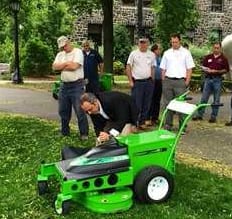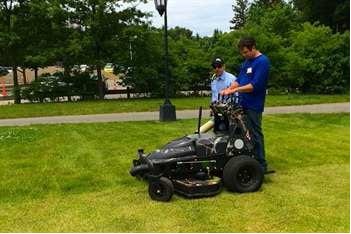by Jamie Banks
Reprinted with permission from Turf magazine’s website, www.turfmagazine.com. For more information, please visit the website or www.LawnSite.com.
I first met Dan Mabe in April 2013 on the UCLA campus. Mabe is founder of the American Green Zone Alliance (AGZA), a training and certification group for electric landscape maintenance equipment and gas-free “Green Zones.” I direct a nonprofit organization, Quiet Communities (Lincoln, Massachusetts), which aims to bring communities and industry together to achieve cleaner, quieter and healthier environments.
I had traveled from Boston to meet Dan at an electric equipment demonstration for the facilities maintenance crew at the UCLA campus in Los Angeles. I was impressed with the electric equipment’s performance and battery life, and clearly so was the crew. I thought then we could be on the verge of an electric revolution in landscape maintenance. After talking, Dan and I realized our organizations shared a common goal. We decided to collaborate.
In June, Quiet Communities, with the participation of AGZA and Mean Green Mowers (Hamilton, Ohio), held its first series of educational and electric equipment demonstration events. Mean Green Mowers is currently the leading manufacturer of commercial-grade, cordless equipment in the U.S. The events were co-sponsored with the sustainability departments at Tufts University and Wellesley College, the town of Lincoln and the Ecological Landscaping Alliance (Massachusetts), Suffolk County and Brooklyn Botanical Gardens in New York, and other public agencies. Continuing education credits were offered by the Massachusetts Landscape and Nursery Association, Northeast Organic Farmers Association and Massachusetts Association of Landscape Professionals.

John Vik, grounds manager at Tufts University watches along with his crew as Dan Mabe, president of the American Green Zone Alliance, demonstrates an electric self-propelled mower.
The events focused on educating people about the health and environmental impacts of gas-powered maintenance and demonstrating a selection of innovative, high-performance, cordless electric equipment, existing as well as emerging prototypes. Thanks to advances in battery technology, brushless motors and controllers, cleaner, quieter and healthier alternatives to gas-based engines are available today, and only getting better.
We had two objectives: to show that we no longer need to rely solely on gas and to explain the important health and environmental benefits of integrating electric into outdoor maintenance. The demonstrations included a full line of mowers, blowers, trimmers, hedge trimmers, edgers and saws from several manufacturers, including Mean Green Mowers and The Greenstation. “This equipment can really start to make a difference in the quality of the environments around our schools, neighborhoods, commercial areas and parks,” says Mabe.
Reasons to Reduce Reliance on Gas
The landscape maintenance industry has grown dramatically over the past 20 to 30 years. Urban areas and suburbs have expanded. With a steady rise in two-income households, fewer people have the time to do their own maintenance work on a routine basis. Tasks once done manually are now done with power equipment. Finally, there has been a shift in aesthetics that has little tolerance for any level of debris. These trends are feeding a dense concentration of gas-powered maintenance companies in many communities. Hundreds of cities, towns and citizen groups across the country are concerned and moving to enact restrictions.
The Benefits of Electric
The commercial electric equipment on the market today includes a full range of mowers, from push, self-propelled, stand up and ride on mowers to blowers, trimmers, hedge trimmers, edgers and chain saws. Lithium battery technology has improved to the point where it is now possible to get eight hours of operation on one charge for some mowers and close to an hour for homeowner models. The performance is comparable to gas. Less maintenance is required and it is all component-based. “When people have the chance to try out the equipment, they realize that what we are saying it is true. It is exciting to watch skepticism change to enthusiasm,” says Mabe.
Landscape maintenance companies have three good reasons to go electric: economics, environment and health. AGZA estimates for a single commercial-grade electric leaf blower, a busy contractor can expect a return on investment as early as 12 months. After that, the savings that come from eliminating gas and oil alone range from $800 to $1,600 per year. If you include maintenance costs, the savings become even greater. “We are seeing these savings validated by our clients, not only for the blowers and mowers, but other hand-held electric equipment as well,” says Mabe. “The immediate fuel savings can help finance the higher upfront cost of the equipment,” he adds. At the same time, going electric reduces fuel consumption and emissions, solid and toxic waste and reduces risks to worker health. By working with electric equipment, companies have an opportunity to differentiate themselves in an intensely competitive market that is trending more towards eco-friendly products and services.
How Will Electric Grow?
The era of electric landscape maintenance is in its infancy. It has a long way to go before it becomes mainstream. Moving from gas- to electric-powered equipment will require industry to change the way it operates and this is where the challenge lies. As for other industries, technology adoption always starts slow with the early adopters. These will be properties and communities that place a premium on clean, quiet environments, like schools, hospitals, luxury properties, parks and municipalities. With increasing visibility and user experience, adoption of electric-powered equipment is expected to accelerate.
Education, training and certification will be essential to the adoption of electric technology. This is where Quiet Communities and AGZA can both play important roles. “For maintenance companies, operating and maintaining electric equipment is much simpler, but it is not the same as for gas equipment,” says Mabe. “It requires training and practice for workers to understand where electric works best and how to properly operate and maintain the equipment. This is AGZA’s mission.”
As for future events, Quiet Communities hopes to host many more around the country.
About the Author
Jamie Banks, Ph.D., MS is executive director of Quiet Communities. She has an extensive background in health outcomes and economics, environmental behavior and policy. Banks earned her Ph.D. in social policy/health economics (University of Kent, U.K.), and her masters’ degrees in clinical evaluative sciences (Dartmouth Medical School, Hanover, New Hampshire) and Interdisciplinary Sciences (Massachusetts Institute of Technology, Cambridge, Massachusetts).


